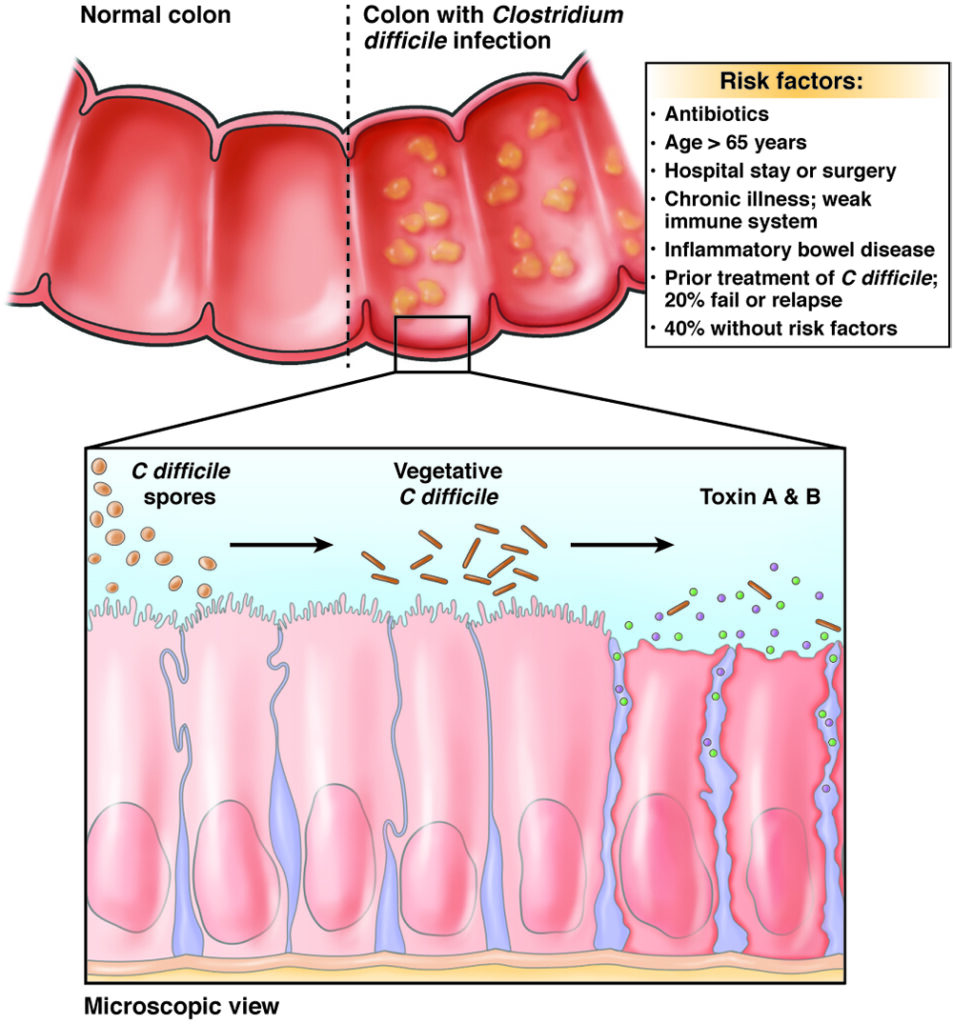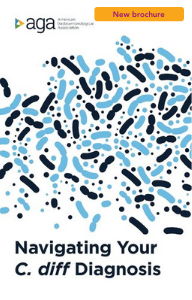What is C. diff?
Clostridioides difficile (previously known as Clostridium difficile), or C. diff for short, is an infection from a bacterium that can grow in your intestines and cause bad GI symptoms.
Each year, C. diff infects roughly 375,000 people in the U.S. and often calls for hospitalization. The main risk of getting C. diff infection is antibiotic use.

Things to know about C. diff:
- C. diff is very contagious.
- C. diff can usually be treated with antibiotics, but sometimes additional treatments are needed to get rid of the infection.
- Unlike other intestinal bacteria, it can take a long time to get rid of C. diff and start feeling better.
- In very bad cases, C. diff infection can be deadly, with estimates of C. diff-linked death ranging from 14,000 to 30,000 each year.
How is C. diff passed?
Perhaps as much as 10% of people carry the bacteria without feeling sick or having symptoms. These people still release the bacteria through their stool. This release in the stool can then go to another person and cause the symptoms.
When people who carry C. diff do not wash their hands after going to the bathroom, they can taint the food they handle leaving the bacteria on things they touch.
The bacteria can survive for months unless the area they are located is fully cleaned with products specifically designed to kill them, like bleach.
If someone touches a surface contaminated with C. diff, they may accidentally ingest the bacteria. This doesn’t mean they will get sick, but they could still carry the bacteria and be able to spread it.
Symptoms of C. diff
The symptoms often start with:
- Watery diarrhea (very liquid stool) three or more times a day for more than two days.
- Belly pain and cramps.
- Mild to moderate nausea.
- Loss of appetite (not feeling hungry).
In more serious cases, symptoms may be:
- Watery diarrhea as often as 15 times per day.
- Severe belly pain and cramping.
- Dehydration.
- Fever.
- Weight loss.
Recurrence of C. diff
Unfortunately about 25% of people with C. diff who are treated correctly with an antibiotic will have a repeat of the same symptoms because the infection has not gone away. Of those people, 45% will get C. diff again.
When to call a doctor
If you get diarrhea within a few days of being admitted to, or released from, a hospital, or within two months of taking an antibiotic, and you have had three or more bouts of diarrhea in 24 hours, C. diff may be the reason.
Talk to your doctor right away.
Risk factors of C. diff
C. diff occurs both in hospitals and long-term-care clinics, like nursing homes, and in non-hospitalized patients who have not taken antibiotics.
While being on antibiotics can make it easier for someone to get C. diff, other things can put you at risk as well, including:
- Being at least 65 years old.
- Having abdominal surgery.
- Existing problems or disease in your intestines, such as inflammatory bowel disease (IBD) or colon cancer.
- Having a weakened immune system because of chemotherapy or other drugs that suppress the immune system, or AIDS.
- Past infection with C. diff, especially a recent infection.
- Treatment with stomach acid-reducing medications.
- Living in a nursing home or being admitted to the hospital.
If you are healthy, you will most likely not get an infection with C. diff. Other organisms often found in your GI tract keep it in check by occupying the sites where C. diff could attach and multiply. Think of these sites as parking spaces — if another organism is already there, C. diff has nowhere to park. C. diff is occurring more often in non-hospitalized community patients, who represent about 50% of cases.
Getting tested for C. diff
The easiest and most specific test for C. diff is a stool test.
- You will give a stool sample in a sterile holder supplied by your doctor’s office or lab.
- The lab will run tests on your stool to look for the C. diff bacteria and/or toxins it releases.
- Stool tests can take 24–48 hours to give results.
Blood tests can show a high white blood cell count, which is a sign of infection in the body.
In a very few cases, your gastroenterologist may feel a test is needed to get a better look at your colon. This test is called a colonoscopy.
A colonoscopy involves looking at the colon from the inside with a long, thin (about the width of your little finger), flexible tube with a tiny camera on the end, through which the doctor can look for signs of C. diff infection, including a specific colitis (inflammation in the colon caused by C. diff) called pseudomembranous colitis.
- You will be given a medicine to block pain and make you feel sleepy, so you won’t feel much during this test.
- It will also let the doctor take tissue samples to look at under a microscope (biopsy) if needed.
A CT scan looks for thickening of the wall of your intestines.
During this test, you may get an IV injection of a special dye that will let the CT machine take better pictures of your intestines.
- If you have an allergy to iodine or shellfish, tell your doctor, because people with these allergies may have a reaction to the dye.
Treatment for C. diff
There are a few options to treat C. diff, but your doctor will choose a treatment based on your case, how bad the infection is and your medical history.
If you get diarrhea while taking an antibiotic, your doctor may tell you to stop taking it or switch to some other type. Based on how long you’ve been dealing with diarrhea or how sick you are, your doctor may want you to get a stool test for C. diff and give you IV fluids and electrolytes so that you do not get dehydrated. Unfortunately, C. diff can be stubborn, so treatment often calls for many steps.
Stopping the antibiotics can commonly resolve diarrhea. However, if you continue to have diarrhea or do not improve, a stool test for C. diff should be performed.
- If C. diff is found in the stool, new antibiotic treatment will be required to clear this infection.
- Your doctor will order a different type of antibiotic to specifically treat the C. diff infection, usually oral vancomycin or fidaxomicin.
- Many people who take antibiotics to treat C. diff infection start to feel better within 3 days, but it is important to keep taking the medication until you finish it (usually 10–14 days). If not, it may not kill all of the C. diff, and the infection could come back (i.e., a recurrence).
- Approximately 25% of people with C. diff will need a second round of antibiotics.
- Good hand washing and special care in shared bathrooms is important to prevent the spread of C. diff to others in the household.
Sometimes you doctor may decide you need an additional treatment, to prevent the infection from returning. There are two types of these treatments:
- Bezlotoxumab: This is an intravenous medication that you receive while you are on the antibiotic to treat C. diff. It helps prevent the infection from returning by blocking the toxins that cause abdominal pains and diarrhea.
- Fecal microbiota transplant: This can be given either orally, as a pill, through a colonoscopy or through an enema after you finish your antibiotics for C. diff. This treatment improves the number of different organisms in your large bowel, making the bowel healthier, which then helps get rid of this infection. There are two U.S. Food and Drug Administration-(FDA) approved forms of this treatment, that we call “Live Biotherapeutic Products.”
Rarely, in very severe, life-threatening cases, it may be necessary to remove the infected part of the intestine.
Complications of C. diff
Severe C. diff can be dangerous, as it can cause rapid dehydration (fluid loss).
If you get dehydrated really fast, it can impact your organs and cause your blood pressure to be dangerously low, damage your kidneys and lead to kidney failure.
In the worst cases of C. diff, you could get holes in the lining of the large intestine. Your intestines could also become quite stretched and swollen and may burst. When bacteria or stool from your intestines get into other parts of the body, either through a hole in the bowel or a ruptured colon, it is a medical emergency that needs urgent surgery, because it can be deadly.
When to call a doctor
If you get diarrhea (very liquid stool) within a few days of being admitted to, or released from, a hospital, or within two months of taking an antibiotic, and you have had three or more bouts of diarrhea in 24 hours, C. diff may be the reason. Talk to your doctor right away.



